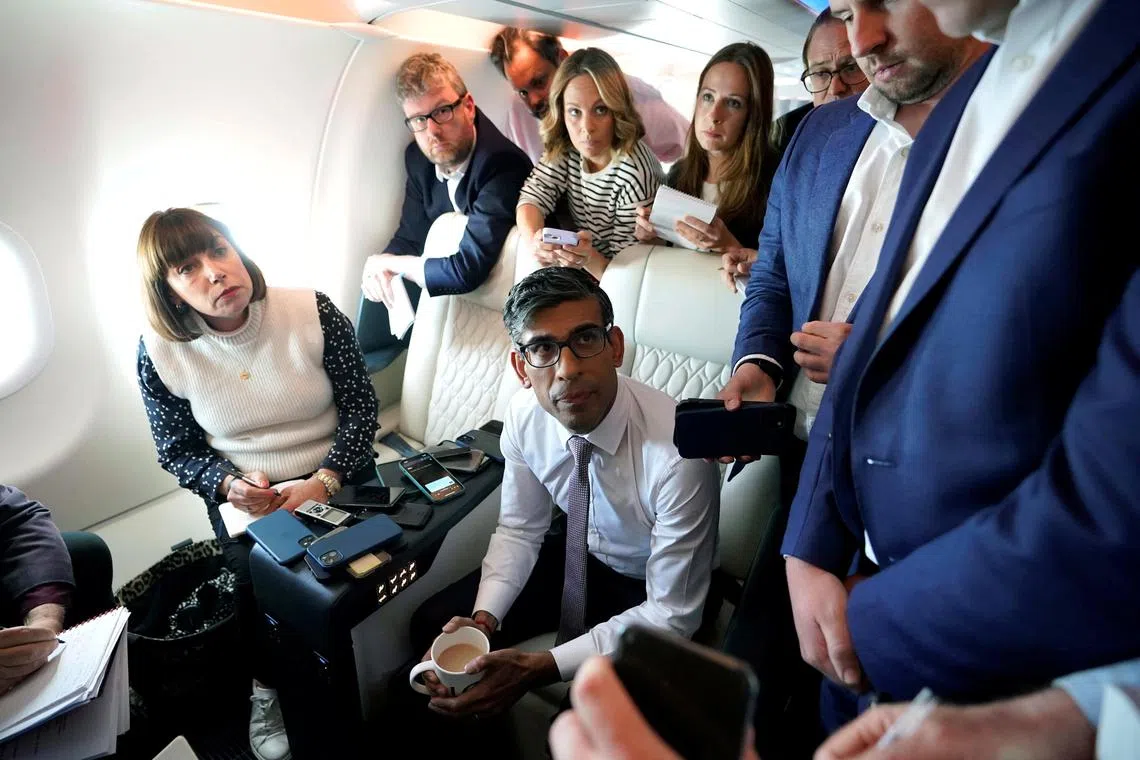British PM Sunak heads to Washington to meet Biden and talk tech
Sign up now: Get ST's newsletters delivered to your inbox

British Prime Minister Rishi Sunak holding a huddle with political journalists on board a government plane as he heads to Washington on Tuesday.
PHOTO: REUTERS
LONDON - British Prime Minister Rishi Sunak headed to Washington on Tuesday lobbying for Britain to take a lead role in regulating artificial intelligence (AI), after a dire warning of the technology’s existential dangers.
Mr Sunak will meet US President Joe Biden on Thursday for a White House summit, pledging unstinting support for Ukraine after Russia was accused of blowing up a major dam to thwart an apparent counter-offensive.
But while the United States and Britain are inching closer to giving Ukraine air support, and on a robust approach to China, Mr Sunak faces a harder sell with Mr Biden about Britain’s post-Brexit relevance elsewhere.
The need for a coordinated response to AI was underlined by Downing Street task force adviser Matt Clifford, who warned that the chances of the fast-learning systems wiping out humanity within two years were “not zero”.
Interviewed on TalkTV, he said the world needs “to regulate them on a global scale, because it’s not enough I think to regulate them nationally”.
Mr Sunak wants a future global AI regulator to be based in London, according to sources, arguing that Britain has the requisite expertise and size of tech sector.
But it is pushing uphill as the United States talks directly to the European Union about AI regulation, to build on a pledge
And Mr Sunak, who meets US business leaders before Thursday’s summit, has given up on securing a post-Brexit trade deal with the Biden administration any time soon.
‘Battlefield advantage’
En route to Washington, the Prime Minister announced cumulative US investment of more than £14 billion (S$23 billion) into Britain – although some of that has already been deployed.
Underlining the US-British military alliance at the heart of the North Atlantic Treaty Organisation (Nato), Mr Sunak said their economic relationship should also be deployed to defend Western democracy.
“By combining our vast economic resources and expertise, we will grow our economies, create jobs and keep our people safe long into the future,” said Mr Sunak, a wealthy former banker who studied in the United States and retains a property in California.
“Just as interoperability between our militaries has given us a battlefield advantage over our adversaries, greater economic interoperability will give us a crucial edge in the decades ahead.”
On the Nato front, Mr Sunak has been talking up Defence Secretary Ben Wallace as the Western alliance seeks a new secretary-general at a summit in Lithuania in July.
In Washington, National Security Council spokesman John Kirby would not be drawn on the possible candidacy of Mr Wallace – with countries pushing for a woman or eastern European to lead Nato for the first time.
“I have absolutely zero doubt that the war in Ukraine will be a prime issue of discussion” in Thursday’s summit, Mr Kirby said.
“And the Brits have been right there – literally at the fore in terms of helping Ukraine.
“I have no doubt that they’ll talk about ways in which we can work together going forward.”
No home run
On Wednesday, Mr Sunak was scheduled to lay a wreath at Arlington National Cemetery outside Washington, before heading to Capitol Hill for talks with leaders in Congress. He would watch the Washington Nationals play the Arizona Diamondbacks for the second annual “UK-US Friendship Day”, marking 238 years of diplomatic relations. But Mr Sunak, a keen cricketer, ducked an invitation to throw the ceremonial first pitch at the baseball game – sparing his blushes if the throw went astray in front of tens of thousands.
After transatlantic disputes over trade and Northern Ireland, Mr Sunak hopes to score better with Mr Biden than his controversial predecessors Boris Johnson and Liz Truss.
Dr Leslie Vinjamuri, director of the US and Americas Programme at the Chatham House think-tank, commented: “The relationship is very strong on the fundamentals: defence, security, developing policy on China.”
But on specifics such as AI and trade, Mr Biden is unlikely to give much away heading into a crunch election year, she told AFP.
“They’re more likely to be naturally aligned on the extent of (AI) regulation, compared with the EU’s heavier touch approach. That’s where the UK does have an advantage,” Dr Vinjamuri said.
“But it would be very hard to put together, very expensive, very time-consuming, and built on very little knowledge.” AFP


